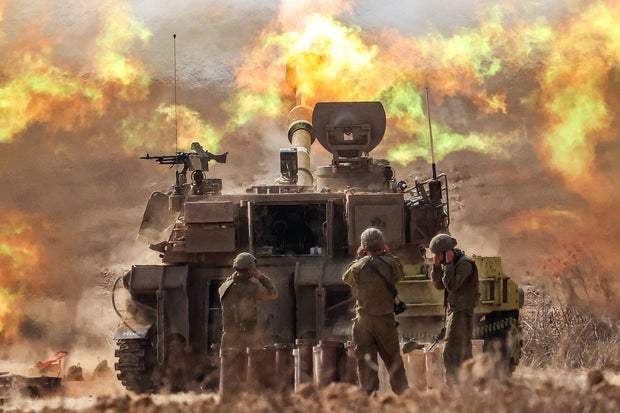An investigation by the Israeli military has determined that Hamas was able to carry out the deadliest terrorist attack in Israeli history on Oct. 7, 2023, because the much more powerful Israeli army misjudged the militant group’s intentions and underestimated its capabilities.
“A large-scale, surprise attack was not considered to be a likely scenario, due to a fundamental misunderstanding of the enemy,” the military said in a summary of the findings, which were released Thursday. “The IDF and intelligence agencies perceived Hamas as a limited and reactive threat and assumed that an early warning would precede any large-scale offensive.”
The findings could pressure Prime Minister Benjamin Netanyahu to launch a widely demanded broader inquiry to examine the political decision-making that preceded the terrorist attack, which triggered the war in Gaza.
The prime minister has not taken responsibility for Israel’s strategy in the years leading up to the attack, saying he will answer tough questions only after the war, which has been paused for nearly six weeks by a tenuous ceasefire. Despite public pressure, including from the families of the roughly 1,200 people killed in the Oct. 7 attack and the 251 taken as hostages into Gaza, Netanyahu has resisted calls for a commission of inquiry.
The military’s main findings were that the region’s most powerful and sophisticated military misread Hamas’ intentions, underestimated its capabilities and was wholly unprepared for the surprise attack by thousands of heavily armed militants in the early morning hours of a major Jewish holiday.
Jack Guez/AFP via Getty Images
In comments made to military commanders Monday, and shared with the media on Thursday, the army’s chief of staff, Lt. Gen. Herzi Halevi, said he took responsibility for the army’s failures.
“I was the commander of the military on October 7th, and I have my own responsibility. I also carry the weight of all your responsibility — that, too, I see as mine,” said Halevi, who announced his resignation in January and is set to step down next week.
The military’s findings are in line with past conclusions reached by officials and analysts. The military released only a summary of the report and military officials outlined its findings.
“Oct. 7 was a complete failure,” one military official told The Associated Press who spoke on condition of anonymity in line with regulations.
A central misconception was that Hamas, which seized control of Gaza from the Palestinian Authority in 2007, was more interested in governing the territory than fighting Israel, the inquiry found.
The military also misjudged the capabilities of Hamas, long designated a terrorist group by the U.S. and Israeli governments. Military planners had envisioned that, at worst, Hamas could stage a ground invasion from up to eight border points, the military official told the AP. In fact, Hamas had more than 60 attack routes.
Intelligence assessed in the aftermath of the attack has shown Hamas came close to staging the offensive on three earlier occasions but delayed it for unknown reasons, the official told the AP.
The official also said that in the hours before the attack, there were signs that something was amiss, including when Hamas fighters switched their phones over to the Israeli network.
The perception that Hamas did not want war guided decision-makers away from taking action that might have thwarted the attack.
“The belief was that Hamas could be influenced through pressures that would reduce its motivation for war, primarily by improving living conditions in the Gaza Strip,” the summary of the report said. “Israel’s policy towards Gaza was based on defense, stabilization and efforts to prevent Hamas’ military buildup, readiness for short periods (i.e. days) of direct conflict, and preparation for a scenario of escalation.”
The Israeli military official told the AP that intelligence shows that Yahya Sinwar, a mastermind of the Oct. 7 attack who was killed last October, had started planning it as early as 2017.
With the military off guard on a holiday weekend, Hamas launched a heavy wave of rockets that allowed thousands of fighters to burst through the security fence or fly over it on hang gliders. They knocked out surveillance cameras and quickly overwhelmed hundreds of soldiers stationed along the border.
From there they advanced to key highway intersections and attacked troops dispatched to the area, including some senior officers, disrupting the military’s command and control, according to a second military official, who also spoke to the AP on condition of anonymity.
For the first three hours after the attack, Hamas fighters marauded through border communities and a music festival with little resistance. That was when most of the 251 hostages were taken and most people were killed, the official told the AP. The official said the chaos led to friendly fire incidents, although he said there were not many, without disclosing a figure.
It took hours for the military to regain control and days until the area was fully cleared of militants.
According to the first official, the report blamed the military for being overconfident in its knowledge and not showing enough doubt in its core concepts and beliefs. The summary said a key lesson was that Israel could not let a threat develop on its border.
It spelled out several recommendations, including creating special units meant to prepare for such surprise and large-scale events, as well as reform in the military intelligence department that would foster “openness, skepticism, listening, learning.”
It did not place blame on any individual soldiers or officers, but is likely to pave the way for a reckoning in the military and eventual dismissals.
Some high-ranking officers other than Halevi have also resigned, including the former head of military intelligence.

